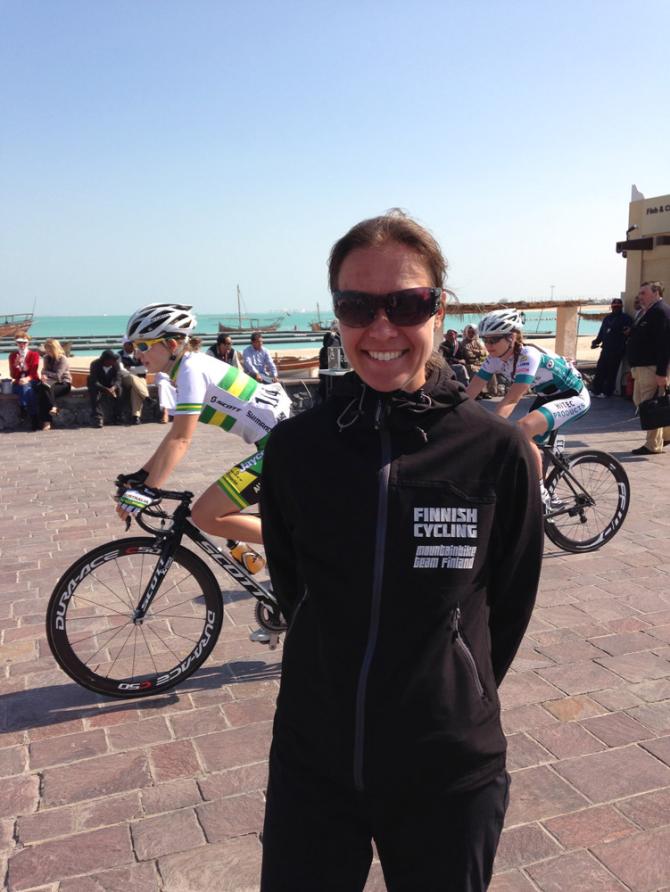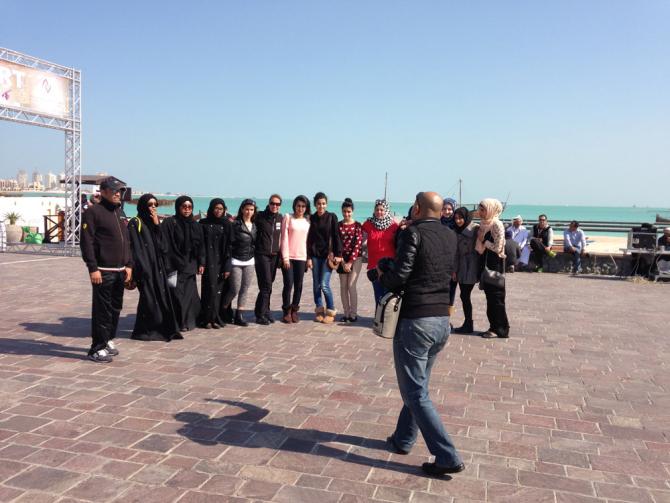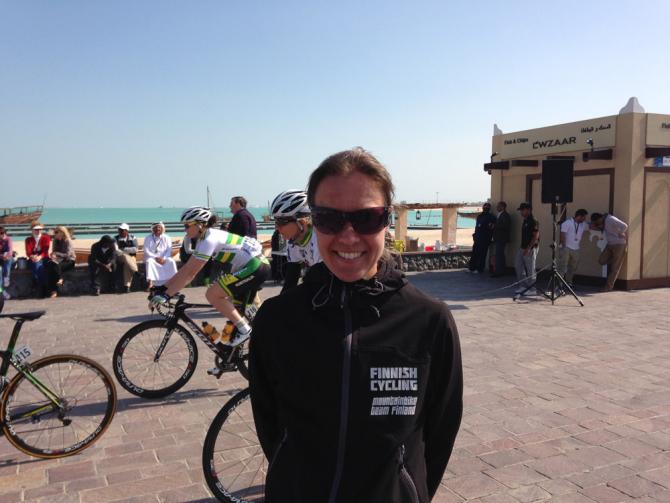Qatar women's team targets 2016 Worlds
Former professional Pia Sunstedt in charge of start-up project



Ambitious projects are nothing new in Qatar. This is, after all, a country that was without a hospital worthy of the name until 1959, but is now the world's wealthiest nation per capita thanks to the exploitation of its oil reserves. This is a land where thousands of years of Bedouin life left scarcely a trace on the desert, but where a fresh cluster of skyscrapers are now added to the Doha cityscape each year almost as a matter of routine.
Yet even by local standards, the country's aim of putting together a women's cycling team in time to compete at the world championships in Doha in 2016 seems like something of a stretch, given that until as recently as three months ago, there were effectively no women cyclists in Qatar.
Under the guidance of Finnish former professional Pia Sunstedt, however, a women's team took its first fledgling pedal strokes in Doha in late November, and visited the start of stage 3 of the Ladies Tour of Qatar on Thursday to sample the atmosphere of a top-level race.
"It's an important step for them just to be here, because they are just learning about cycling," Sunstedt told Cyclingnews. "They've been able to speak with professional cyclists, and ask questions about training, about racing, about everything. These girls know nothing about cycling, the knowledge is just zero, so this is very important."
Sunstedt has 27 riders under her tutelage, ranging from 13 to 25 years of age, and they began training from scratch in December. Some had been identified as athletes by the country's sporting hub, the Aspire Academy, while others were recruited from local universities, and more have since been invited to the fold by friends and cousins.
"We first started talking a year ago, but the project really started in November," said Sunstedt, a winner of three marathon World Cups as a mountain biker and a clutch of top-level races on the road during her own lengthy professional career. "We got ten girls together initially and we started to do some basic training – how to mount and dismount a bike, how to brake, how to ride corners. These girls haven't been riding bikes at all, so we've had to start with some really basic things, but now we have ten girls on road bikes."
Grassroots
Get The Leadout Newsletter
The latest race content, interviews, features, reviews and expert buying guides, direct to your inbox!
Qatar's foray into international sport has become something of a trademark over the past fifteen years or so, although the gulf state's sporting ambitions have faced increasing scrutiny since it won the right to host football's World Cup in 2022. The bidding process has itself drawn questions, and far more damning is the chilling statistic that 185 Nepalese immigrants working on construction projects for the tournament died in 2013 alone.
On a purely sporting level, there is also a nagging sense that while top-level competition has been appropriated by Qatar to promote the state's commercial interests on the international stage, little effort has been made to ensure that the events it hosts leave a more lasting imprint at grassroots level.
That impression has perhaps been borne out by the Tour of Qatar, which has yet to see local riders make any significant impression. A Qatari men's team participated in three earlier editions of the race, but struggled and has not been back since 2008, while the Ladies Tour of Qatar has been entirely without home participation in the six years of its existence.
Sunstedt argues, however, that Qatar's sporting development cannot be expected to match its economic growth step for step. "You have to remember that 50 years ago, they were Bedouins, they were living in tents, and with 50 degree heat, you're not doing any sport," she said. "We have to remember this, because this is the start for a very young country in sports. They are just discovering sports."
For cultural reasons, women's sport is an even more recent phenomenon in Qatar and the Arabian peninsula at large, a fact reflected by the fact that most of the athletes on Sunstedt's squad continue to wear the hijab while riding. "I have a few girls who want to ride with short shorts, but must of them want to ride covered. I've told them it's up to them to decide. It's a cultural thing and you have to respect that," she said.
Olympics
Qatar's ultimate sporting aim is to host the Olympic Games, and the 2016 Worlds and even the 2022 World Cup itself are viewed locally as stages in an ongoing bidding process. Gender equality has – belatedly – become a priority for the international Olympic movement, and to that end, the Qatari Olympic Committee hired TSE Consulting last Autumn to develop a four-year plan for women's sport in the country.
Ironically, however, Sunstedt's involvement with cycling in Qatar came about rather haphazardly. After hanging up her wheels following the London Olympics, she moved to Doha last year due to her husband's work commitments. A chance encounter with men's coach Branko Filip while changing a mountain bike tyre at a petrol station ultimately landed Sunstedt the position of Qatari women's coach.
It remains to be seen whether a group of novices will be able to develop in time to take the start line at the Doha Worlds in two and half years' time, and Sunstedt is pragmatic in her appraisal of their chances. The most realistic option, it seems, will be to field riders in the junior women's race.
"It's very soon, but hopefully we will have a team at the start line, but I don't know how many girls," she said. "I have many girls who are 15 or 16 years old now and I think those girls have a better chance to be at the start line of the Worlds, in the junior race, because two years from now – well, it's almost tomorrow."
The project, Sunstedt explained, is a long-term one, which will extend beyond the Doha Worlds. A preliminary target, both for 2016 and beyond, is to find regular international competition for the Qatari women, although that is no easy task.
"We have to focus on this part of the world because these girls won't be able to race in Europe yet," she said. "We have 27 riders now, so we can start with internal racing and then see if there are any races in neighbouring countries. In Saudi Arabia, I don't think it's possible because it's more conservative than here and women aren't even allowed to drive cars there. Perhaps we'll see if we can make some races here and then in the Emirates, maybe a kind of series."
For now, the Qatari women's international exposure has been limited to a short training ride with Chloe Hosking and her Hitec Products team on the eve of the Ladies Tour of Qatar. "We went out there the day before the race and just did an 11k circuit with the girls," Hosking said. "They are having the biggest cycling race in the world here and they want to have a national team – you can't just wait around for that to happen."

Barry Ryan was Head of Features at Cyclingnews. He has covered professional cycling since 2010, reporting from the Tour de France, Giro d’Italia and events from Argentina to Japan. His writing has appeared in The Independent, Procycling and Cycling Plus. He is the author of The Ascent: Sean Kelly, Stephen Roche and the Rise of Irish Cycling’s Golden Generation, published by Gill Books.